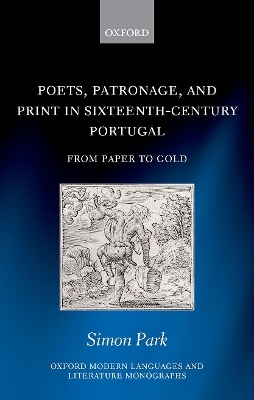
Poets, Patronage, and Print in Sixteenth-Century Portugal
From Paper to Gold
Seiten
2021
Oxford University Press (Verlag)
978-0-19-289638-4 (ISBN)
Oxford University Press (Verlag)
978-0-19-289638-4 (ISBN)
Explores the works and careers of a group of Renaissance Portuguese poets, and illuminates the ways in which they conceived of themselves and their practice, the systems of patronage within which they worked, and the challenges they faced in the pursuit of publication.
Portugal was not always the best place for poets in the sixteenth century. Against the backdrop of an expanding empire, the country's annexation by Spain in 1580, and ongoing religious controversy, poets struggled to articulate their worth to rulers and patrons. This did not prevent them, however, from persisting in their craft. Indeed, many of their works reflected precisely on the question of what poetry could do and what, ultimately, its value was. The answers that poets like Luís de Camões, Francisco de Sá de Miranda, António Ferreira, and Diogo Bernardes offered to these questions, and which are explored in this book, ranged from lofty ideals to the more practical concerns of making ends meet when one depended on the whims of the powerful.
This volume articulates a 'pragmatics of poetry' that combines literary analysis and book history with methods from sociology (network analysis, sociology of professions, valuation studies) to explore how poets thought about themselves and negotiated the value of their verse in the court, with patrons, or in the marketplace for books. It reveals how poets compared their work to that of lawyers and doctors and tried to set themselves apart as a special group of professionals. It shows how they threatened their patrons as well as flattered them and tried to turn their poetry from a gift into something like a commodity or service that had to be paid for. While poets set out to write in the most ambitious genres and to better their European rivals, they sometimes refused to spend months composing an epic without the prospect of reward. Their books of verse, when printed, were framed as linguistic propaganda as well as objects of material and aesthetic worth at a time when many said that non-devotional poetry was a sinful waste of time. This is a book about the various ways in which poets, metaphorically and more literally, tried to turn poetry and the paper it was written on into gold.
Portugal was not always the best place for poets in the sixteenth century. Against the backdrop of an expanding empire, the country's annexation by Spain in 1580, and ongoing religious controversy, poets struggled to articulate their worth to rulers and patrons. This did not prevent them, however, from persisting in their craft. Indeed, many of their works reflected precisely on the question of what poetry could do and what, ultimately, its value was. The answers that poets like Luís de Camões, Francisco de Sá de Miranda, António Ferreira, and Diogo Bernardes offered to these questions, and which are explored in this book, ranged from lofty ideals to the more practical concerns of making ends meet when one depended on the whims of the powerful.
This volume articulates a 'pragmatics of poetry' that combines literary analysis and book history with methods from sociology (network analysis, sociology of professions, valuation studies) to explore how poets thought about themselves and negotiated the value of their verse in the court, with patrons, or in the marketplace for books. It reveals how poets compared their work to that of lawyers and doctors and tried to set themselves apart as a special group of professionals. It shows how they threatened their patrons as well as flattered them and tried to turn their poetry from a gift into something like a commodity or service that had to be paid for. While poets set out to write in the most ambitious genres and to better their European rivals, they sometimes refused to spend months composing an epic without the prospect of reward. Their books of verse, when printed, were framed as linguistic propaganda as well as objects of material and aesthetic worth at a time when many said that non-devotional poetry was a sinful waste of time. This is a book about the various ways in which poets, metaphorically and more literally, tried to turn poetry and the paper it was written on into gold.
Simon Park is Associate Professor of Medieval and Renaissance Portuguese at the University of Oxford and Tutorial Fellow at St Anne's College, Oxford.
Introduction: What Am I to Do with This Book?
1: What Is a Poet?
2: What Do Poets Want to Write?
3: What Else Do Poets Want? And How Do They Get It?
4: Why Print Poetry?
Afterword: Between a Rock and a High Place
Appendix 1: A Network Map of Poetic Dedications
| Erscheinungsdatum | 01.09.2021 |
|---|---|
| Reihe/Serie | Oxford Modern Languages and Literature Monographs |
| Zusatzinfo | 11 Illustrations |
| Verlagsort | Oxford |
| Sprache | englisch |
| Maße | 143 x 222 mm |
| Gewicht | 414 g |
| Themenwelt | Geisteswissenschaften ► Sprach- / Literaturwissenschaft ► Anglistik / Amerikanistik |
| Geisteswissenschaften ► Sprach- / Literaturwissenschaft ► Literaturwissenschaft | |
| ISBN-10 | 0-19-289638-5 / 0192896385 |
| ISBN-13 | 978-0-19-289638-4 / 9780192896384 |
| Zustand | Neuware |
| Haben Sie eine Frage zum Produkt? |
Mehr entdecken
aus dem Bereich
aus dem Bereich
Poetik eines sozialen Urteils
Buch | Hardcover (2023)
De Gruyter (Verlag)
59,95 €
Buch | Softcover (2024)
belleville (Verlag)
20,00 €


